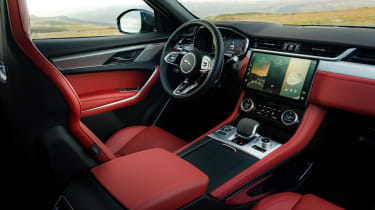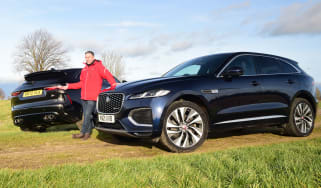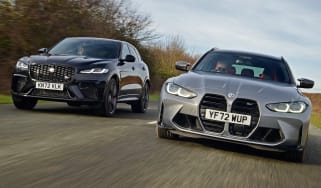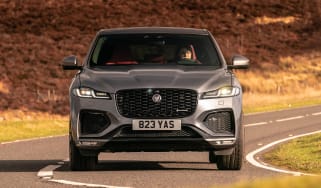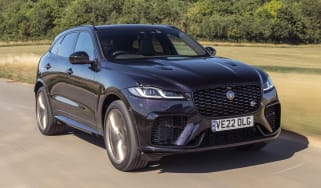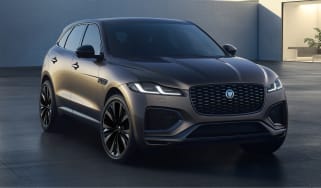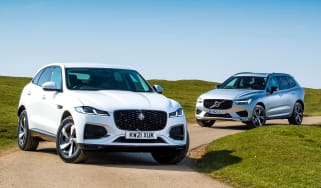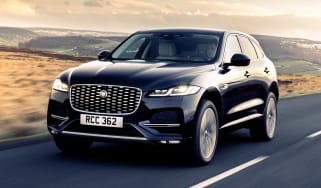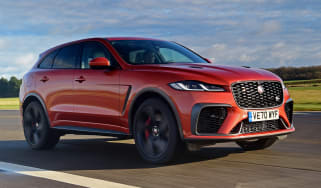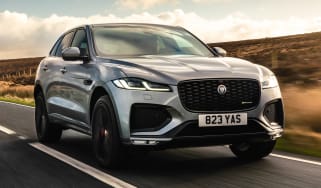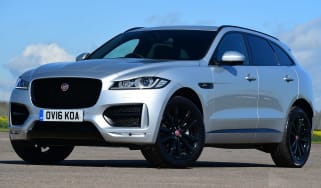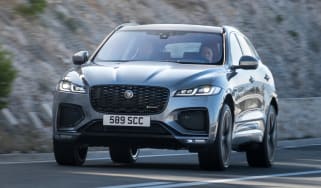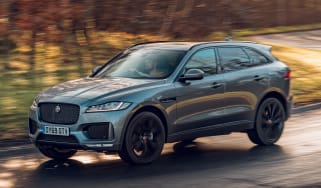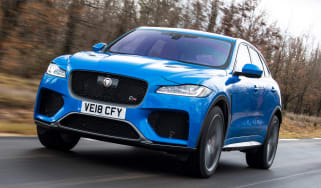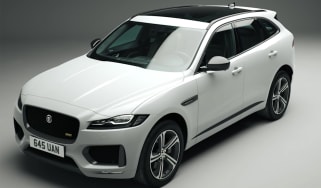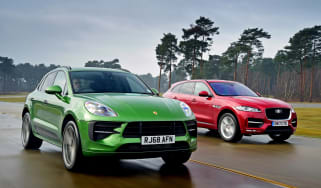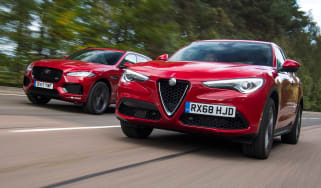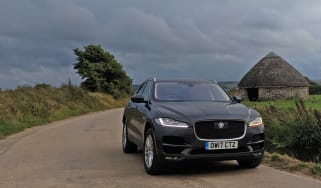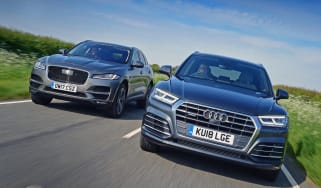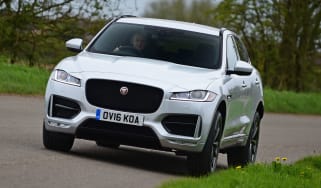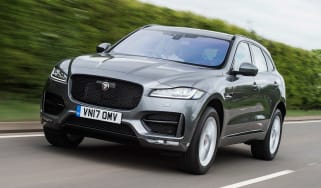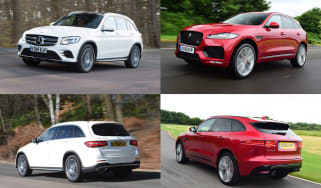Jaguar F-Pace review
With updated onboard tech and hybrid power, the Jaguar F-Pace is still a front runner in the upmarket SUV class

Jaguar hit the bullseye in 2016 with its first SUV. The F-Pace has good looks and a classy interior, and it proves that you don't need to sacrifice driving excitement when choosing a family-friendly crossover. It's got competition from the Volvo XC60 and BMW X3, but the F-Pace remains one of our favourite all-rounders.
Until 2016, people were used to Jaguar selling saloons and sports cars, but the F-Pace began a new era for Jaguar. The British manufacturer's first SUV still retains the DNA that has made 80 years-worth of sporting models so popular both in the UK and abroad - and healthy global sales have backed this up.
About the Jaguar F-Pace
The F-Pace is as luxurious and comfortable as a Jag 4x4 should be, while its relatively high running costs are somewhat addressed by mild-hybrid and plug-in hybrid powertrains. Under the skin, the F-Pace shares running gear with the XE and XF models, but the SUV body means it offers greater practicality than its saloon siblings.
The F-Pace is a front-runner in the mid-sized premium SUV class, where it rivals models such as the Audi Q5, BMW X3 and Mercedes GLC. Also worth considering are alternative choices such as the Alfa Romeo Stelvio, Porsche Macan, Lexus NX and Volvo XC60, as well as the Range Rover Velar, which is similar to the F-Pace under the skin.
Used - available now

2022 Renault
Captur
12,132 milesManualPetrol1.0L
Cash £14,295
2022 Citroen
C5 X
42,872 milesAutomaticPetrol1.2L
Cash £12,901
2025 Toyota
Yaris
40,037 milesAutomaticPetrol1.5L
Cash £15,450
2022 Mazda
CX-30
37,037 milesManualPetrol2.0L
Cash £13,831A facelift in late 2020 saw minor revisions to the F-Pace's already handsome exterior, while the cabin was treated to a significant overhaul. The most notable update was the addition of a larger 11.4-inch infotainment touchscreen, running Jaguar Land Rover's latest Pivi Pro operating system.
Another series of updates in 2023 saw further improvements made to the plug-in hybrid F-Pace’s efficiency. The P400e PHEV received a larger 19.2kWh battery in order to boost its pure-electric range up to 40 miles. This simultaneously reduced its already low Benefit-in-Kind (BiK) rating, making it even more appealing to company car drivers.
From launch there have been a wide variety of F-Pace variants to choose from, but Jaguar slimmed down the lineup in 2023. The R-Dynamic S is now the entry-level model, but it’s well-equipped with the aforementioned Pivi Pro infotainment system, wireless Apple CarPlay and Android Auto, LED lighting, two-zone climate control and numerous safety features all fitted as standard.
Stepping up to the R-Dynamic SE Black adds some cosmetic enhancements, a panoramic roof, keyless entry and privacy glass. The highest spec R-Dynamic model is the HSE Black, which features massaging seats and 21-inch alloy wheels, among other kit.
The engine lineup for the F-Pace has also seen some changes, and now includes three petrols, two diesels and a plug-in hybrid powertrain. All three R-Dynamic models are available with the P250 four-cylinder petrol engine, D200 four-pot diesel and the P400e plug-in hybrid. On top of those, higher-spec SE and HSE Black cars are also offered with the 295bhp D300 six-cylinder diesel motor.
If you fancy reliving Jaguar’s sporting heritage or just want some extra oomph from your F-Pace, the 400 Sport model is powered exclusively by the P400 turbocharged straight-six petrol engine that produces close to 400bhp. If all-out performance is what you desire, the F-Pace SVR features a supercharged 5.0-litre V8 under the bonnet and will go from 0-62mph in four seconds flat – enough to keep up with a number of supercars.
Engines, performance and drive
Jaguar could have turned to sister brand Land Rover for help with its first SUV, but instead it developed its own platform for the F-Pace. The F-Pace is based on Jaguar’s iQ-AL platform that also partly underpins the XE and XF saloons. This helps the F-Pace feel as sporty to drive as it looks. That’s because it shares the saloon’s suspension set-up, which uses double wishbones at the front and a multi-link rear axle that’s set-up to deliver engaging handling.
Where the Jaguar has a real edge over its rivals is the way it drives. With lots of grip and good body control, the F-Pace is fun to drive; it’s hard to believe a high-riding SUV can handle as well as this. It remains composed even on bumpy roads, and comfort doesn’t take too much of a hit to deliver those fun dynamics. The eight-speed auto transmission is smooth enough when left to work itself, although we found switching to the manual shift paddles produced more sluggish gear changes.
There’s very little road and wind noise, plus the ride is nearly as supple and well controlled as the Mercedes GLC with its air suspension. Bigger undulations can upset the SUV’s balance, but you’ll never notice jolts in the cabin – even on the larger alloy wheels.
The F-Pace is surprisingly capable off-road, too. While Jag is leaving the proper tough stuff to Land Rover, the F-Pace is admirably efficient when faced with muddy ruts or a grassy field. The four-wheel-drive system does sometimes scrabble for grip, but that's more down to the road-biased tyres, and on the whole it gives you confidence to push the car some way off the beaten track.
In normal driving, the 4WD system features a clever system that sends more power to the rear wheels to give a purer feel, but switches extra drive to the front wheels when it senses a more even split of traction is required.
Jaguar also offers the optional Dynamic Pack, which costs around £2,900 and adds adaptive dampers. These are continuously adjustable and constantly alter to the road conditions, unlike most rivals which have pre-set modes. It’s a pricey package, but is worth choosing because there’s a better mix of comfort and agility.
0-62mph acceleration and top speed
Jaguar F-Pace buyers get a broad choice of engines. The entry-level, four-cylinder D200 diesel produces 201bhp and 430Nm of torque; enough to propel the mid-size premium SUV from 0-62mph in 8.2 seconds. The six-cylinder D300 pumps out 296bhp and completes the same benchmark sprint in 6.4 seconds.
The petrol-powered cars inevitably bring quicker acceleration, and even the least powerful 246bhp P250 posts a 0-62mph time of 7.3 seconds. The 395bhp P400 six-cylinder in the 400 Sport-spec models takes 5.4 seconds to reach 62mph from a standstill, while the 398bhp P400e plug-in hybrid only needs 5.3 seconds to hit 62mph.
The fire-breathing F-Pace SVR is frankly ridiculous and will put some supercars to shame in a straight line. Its supercharged V8 pumps 542bhp and 700Nm of torque that can propel the two-tonne SUV from a standstill to 62mph in just four seconds, before moving on to a top speed of 178mph.
MPG, CO2 and running costs
One area where Jaguar needed to improve the F-Pace concerned running costs and its poor fuel economy compared to rivals. All cars, with the exception of the entry petrol, now feature mild-hybrid technology, while a plug-in hybrid is also available.
The four-cylinder D200 diesel offers claimed economy of 41.5-44.8mpg on the WLTP combined cycle, with CO2 emissions of 166-178g/km. You'll pay the price if you opt for the six-cylinder D300 diesel, though. Not only does it cost around £7-9k more to buy than the equivalent four-pot diesel, it manages just 37.2-39.2mpg and produces a not very green 189-200g/km of CO2.
If you prefer petrol power, the base 2.0-litre four-cylinder P250 returns a maximum of 30.7mpg while the six-cylinder P400 will return 28.8mpg at best. Both emit well over 200g/km of CO2.
Choose the plug-in hybrid and Jaguar claims you'll see 156.9-176.6mpg, provided you keep the battery fully topped up. CO2 emissions of 37-41g/km make the PHEV the obvious choice for company car drivers. However, after covering more than 20,000 miles in our F-Pace P400e long-term test car, we only managed to achieve 28.4mpg, though that was largely because we didn’t manage to charge it as regularly as we’d have liked.
This goes to show just what happens when you don’t charge a plug-in hybrid frequently enough. So if you plan to get the F-Pace P400e, you should also figure out how you’re going to top it up, whether than be public chargers or a home wallbox.
Unsurprisingly, the F-Pace SVR, with its 5.0-litre supercharged petrol V8, is by far the least option in the engine range. According to Jaguar, it will return just 23.5mpg while emitting 274g/km of CO2, however during our twin test with the BMW M3 Touring, the F-Pace SVR managed to achieve just 18.3mpg.
Electric range, battery and charging
The F-Pace P400e uses a 19.2kWh lithium-ion battery to offer a pure-electric driving range of up to 40 miles. Unlike the majority of plug-in hybrids, the F-Pace does have rapid charging capabilities, although only up to speeds of 32kW. Nevertheless, recharging the battery to 80 per cent should take about half an hour if you use a suitably fast charging point.
We don’t expect many plug-in F-Pace drivers will make regular use of this however, so a slower 7kW wallbox top-up time is perhaps more relevant. It’ll take an appropriate home or public charger two and a half hours to fully recharge the F-Pace’s battery.
Insurance groups
The F-Pace sits in insurance groups 33-50. The R Dynamic S and R-Dynamic SE Black sit at the lowest end of this scale when fitted with the D200 diesel engine. The plug-in hybrid sits in group 43 while, unsurprisingly, the SVR performance model sits at the top in group 50.
Check if your car needs an MoT and view its complete history with our MoT History Checker...
Interior, design and technology
The Jaguar F-Pace remains faithful to the original C-X17 concept first revealed back in 2013 at the Frankfurt Motor Show, and it's arguably one of the best-looking SUVs on the market. Designer Ian Callum did a great job, and the upright, bluff nose and mesh grille, along with the narrow headlights, give the F-Pace a sporty appearance. But despite its vast proportions, its hunkered shape helps to disguise its bulk.
From the front, the F-Pace looks intimidating with its big grille and swept-back headlights, while the Jaguar’s coupe-like profile and narrow window line add an aggressive touch. R-Dynamic versions get sportier-looking bumpers and a trim-specific grille, while Jag offers a range of personalisation options to help you individualise your car.
Subtle visual updates for the 2020 facelift included revised front LED lights that feature the twin J-shaped lighting signature first seen on the I-Pace, along with an enlarged grille. New LED tail-lamps have also been incorporated into the rear design.
The refreshed F-Pace’s gear selector no longer rises out of the centre console, instead there's now a stubby ‘palm-shifter’ that features cricket ball-like stitching. The electric window switches have been moved from the top of the door to the more traditional armrest area, while Jaguar has also injected some added practicality with larger storage holders for bottles.
Sat-nav, stereo and infotainment
Updated F-paces feature JLR’s latest infotainment system called Pivi Pro. It features a gently curved 11.4-inch display that sits slightly proud of the dashboard. It looks great; the graphics are razor-sharp and the colours are bright.
The homepage is split into three sections for navigation, media and phone settings, with a main menu for the other functions to the side. Loading times are incredibly quick; from homepage, to postcode entry to the first instruction of a fully loaded road route takes just 20 seconds which, for comparison, is 12 seconds faster than when we completed the same process in a Volvo XC60.
It’s a shame that there’s no physical shortcut controls anywhere, but the system is generally so good that you rarely miss them. Our only real criticism comes with the screen itself; it’s so shiny that fingerprint smudges show up easily.
Practicality, comfort and boot space
The Jaguar F-Pace is aimed at a variety of SUV buyers and hopes to steal sales from a range of rivals. These include the BMW X3 and Audi Q5, as well as larger models like the X5 and Q7.
There’s only one body style, but if you want something a bit smaller and more manageable, there's always the E-Pace. The all-electric I-Pace slots between these two, but has a bit more space inside than the F-Pace.
Back to the F-Pace, and there’s plenty of room up front and loads of adjustment for the seats and steering wheel. Considering its almost coupe-like proportions, space in the back isn’t bad either, and if you avoid the full-length panoramic roof that restricts headroom then you’ll be able to seat six-foot adults in the rear.
Dimensions and size
The Jaguar F-Pace is 4,747mm in length, which makes it longer than an Audi Q5, although slimmer and stubbier than a Q7. There’s much more room inside than you’ll find in a Porsche Macan, and it very nearly matches models like the more expensive Cayenne for outright carrying capacity.
Leg room, head room & passenger space
The Jaguar F-Pace is an extremely comfortable car to drive. It seems perfectly suited to all types of road – munching motorways, A-roads and urban environments with ease. The seats are supportive and there’s loads of adjustment to allow even the fussiest drivers to get set behind the wheel.
In the back, there’s loads of leg and knee room, and – providing you avoid the full-length panoramic roof – there’s enough headroom for even taller adults. Despite the narrow windows there’s plenty of light, and because you sit low in the car the coupe-style roofline doesn’t affect headroom too much. This means that even tall adults will be comfortable. Where a Porsche Macan feels rather claustrophobic, the F-Pace exudes a sense of spaciousness that isn’t usually possible on cars with such stylish sloping rooflines.
Access is good, too, thanks to doors that open wide – meaning fitting an Isofix child seat in the rear is all too easy. The seats fold 40:20:40, allowing a myriad seating combinations depending on who or what you’re carrying.
Boot space
The F-Pace is impressively packaged. As well as being big enough to carry five six-foot adults, you’ll also find a decent 613 litres of boot space with the rear seats in place. This expands to 1,440 litres when the 40:20:40 split rear seats are folded flat.
However those figures don't apply to the plug-in hybrid F-Pace, because its batteries are housed underneath the boot floor. As a result, you only have 485 litres to work with when the rear seats are in place. Folding the rear seats down gives you 1,299 litres to work with.
More problems arise when you want to slide in big, mucky loads for the tip. Beautiful details like the brushed metal boot lip are just asking to be scratched, while the plush leather seats aren’t likely to look as fresh in 60,000 miles time. There are various tie-down points and nets though, meaning it’s fairly easy to secure loose loads.
Towing
The maximum braked trailer towing capacity for the Jaguar F-Pace is 2,400kg, with the exception of the P400e plug-in hybrid version which has a 2,000kg rating.
Reliability and safety
With six airbags, lane departure warning and auto braking including pedestrian detection all standard-fit, the Jaguar offers a strong level of safety kit. This certainly helped the F-Pace during Euro NCAP’s extensive crash testing, as Jaguar’s mid-size SUV received the maximum five-star rating back in 2017.
In addition to its tough SUV body and other safety features, every F-Pace is equipped with Emergency Brake Assist and Autonomous Emergency Braking (AEB). The latter can detect pedestrians – first providing a warning before automatically applying the brakes to prevent impact. Cruise control with a speed limiter is also available, as is lane departure warning.
As an ownership proposition, the Jaguar F-Pace managed to come in 50th place on our best cars to own list, which is based on owners’ feedback from our most recent Driver Power customer satisfaction survey. Jaguar also performed well in this year’s survey, and finished 10th (out of 32 brands) in the best car manufacturer rankings – well ahead of key rivals Audi, BMW and Mercedes.
Warranty
As with many premium rivals, the Jaguar F-Pace comes with a three-year, unlimited mileage warranty. With every new car you also benefit from three years roadside assistance, which will prove handy if anything does go wrong. Jaguar also offers owners the option to extend the car's warranty by a year or two for an additional cost, and this can also include MoT insurance to ensure the car passes its first test.
Servicing
Jaguar offers a range of options to make paying for servicing costs a little easier. You can either pay nothing on the day and spread payments over a month, or select a payment spread plan.

